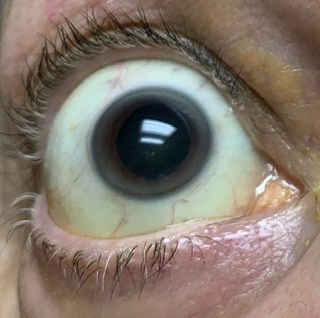Written by: Dr. Stephanie Mulick, O.D.
I was so confused when someone told me they had a popped eye. What does that mean? I still don’t know but I can assume a couple of things.
“My eye popped!” could it be Exophthalmos or Proptosis
Exophthalmos or Proptosis is a condition in which one or both eyes protrude from the orbit, giving an appearance of bulging eyes.
The most common cause of bilateral exophthalmos is Grave’s disease.

Grave’s Disease or Thyroid Eye Disease:
Grave’s disease is a condition that results in an over-active thyroid gland causing more thyroid hormone to be produced than what is needed (hyperthyroidism). The symptoms of hyperthyroidism can include weight loss, frequent bowel movements, trouble sleeping, heat intolerance and bulging eyes. It is more common in females than males and usually presents between the ages of 30-50. It is more likely to develop in people with a family history or those with an autoimmune disease.
Work up/Examination
- History of thyroid disease
- Cigarette smoking: increases the risk for ocular symptoms
- Hertel Exophthalmometer: to measure the amount of proptosis
- Extraocular motility test: to determine if there is limited eye movement
- Complete health evaluation of the eyes including a dilated eye exam
- Thyroid blood tests: T3, T3RU, T4, and TSH
- CT scan
- Communication between Endocrinologist and Ophthalmologist for proper treatment
The following video is from Dr. Tayani a fellowship trained Oculoplastic surgeon.
Several other conditions can cause Exophthalmos including:
- Cysts
- Trauma
- Hemorrhages
- Aneurysm
- Infection
- Neoplasm: mass or tumor
- Pseudotumor
- Sarcoidosis: an inflammatory condition which causes granulomas to build up in the body
- Increased intracranial pressure
A Unilateral proptosis can be caused by an increase in the volume of the tissue behind one eye.
Conditions that can cause eyes to protrude forward:
| Condition | Laterality (unilateral or bilateral) | Age of Onset |
| Grave’s Disease | Usually Bilateral Rarely Unilateral | 20-50 years old females more than males |
| Congenital Craniofacial synostosis | Bilateral | At Birth |
| Osteitis deformans or Paget Disease | Bilateral | Over 55 years old males more than females |
| Childhood Rickets | Bilateral | 6-36 months old |
| Dermoid cyst | Unilateral | Birth to 5 years old |
| Non-traumatic Orbital hemorrhage (very rare) | Unilateral | 20-78 years old |
| Tumors | Usually Unilateral/ rarely Bilateral | Varies depending on etiology |
| pseudotumor/Idiopathic intracranial hypertension | Unilateral | Most common in obese women age 11-58 |
| Histiocytosis | Bilateral | 1-15 years old |
| Traumatic aneurysm | Unilateral | Most common in females age 30-60 |
| Amyloidosis | Bilateral and Unilateral | 60-70 years old |
| Sarcoidosis | Usually Unilateral/ rarely Bilateral | Typically age 25-40, but sometimes older |
| Carotid-Cavernous Fistula: spontaneous (rare) and traumatic | Usually Unilateral/ rarely Bilateral | 20 years old and up |
| Cavernous sinus thrombosis (extremely rare condition) | Unilateral | Most common in females under 50 years old |
Conclusion:
I still don’t know exactly what “popped eye” means, but two conditions come to mind:
- Exophthalmos/Proptosis “bulging eye” which can be caused by several conditions, the most common of which is Grave’s disease.
- a subconjunctival hemorrhage or broken blood vessel of the eye is simply just a bruise of the eye requiring no treatment, review my post on subconjunctival hemorrhage for more information.


